
UNITED Bulawayo Hospitals (UBH) has increased its live-saving surgical operations from 100 to 300 per month as one of the country’s largest referral hospitals makes considerable strides in its maternal health services.
Speaking to journalists on Tuesday this week, UBH obstetrics and gynaecology head Mpumulelo Sibanda said the institution had improved on service delivery to expecting mothers owing to improvements in the department.
Some of the advancements include the construction of a second operating theatre at the hospital’s family health centre, which focuses on everything related to maternal health.
“We have seen our waiting times improve over the years. We used to book patients perhaps after a few months for that particular surgery, but for those with malignancies, surgeries are done the very next week,” Sibanda said.
“For those with non-malignant cases, surgery is done within that month of our initial presentation. That in itself is something to celebrate as a unit, overall.
“We are yearning and striving for the best in terms of servicing our population. We are also striving to enter reproductive medicine, where we also hope those who are struggling with infertility eventually are assisted in some form through in-vitro fertilisation.”
He said they were focusing on achieving a zero maternal deaths target.
“In terms of the obstetric aspect, we are striving towards the 2030 SDGs [sustainable development goals], where ideally as a nation we should have maternal deaths less than 140 per 100 000 women. Obviously, the idea is not to lose any mother in terms of childbirth,” he said.
- Hospitals face acute staff shortage
- ‘Blood, drug shortages hit UBH’
- Man fatally assaulted over touting
- Byo vendors, council clash over vending bays
Keep Reading
UBH acting clinical director Trust Mushawarima said the hospital achieved the milestone through government efforts through the Health Resilience Fund.
“At any given time, we have around 300 patients in the maternal health [section] that are admitted in our hospital. In a month, we do about 300 caesarean sections.
“These numbers are actually increasing over time. Previously, we used to do about 100 operations per month. But because of our Health Resilience Fund and its implementing partners, that are giving us infrastructure and equipment, anaesthetic equipment, we are now able to do more numbers,” he said.
“It has equipped our doctors to be able to do a lot more numbers, which has actually contributed to the reduction of maternal mortality in our institution. As we have seen during the tour, we have such a beautiful facility, which is contributing a lot in this hospital,” he said.
“We used to have only one theatre in the maternal hospital. Now, we have actually two theatres. This means that we can actually attend to emergency caesarean sections. They can be done on time and this actually contributes to the survival of mothers needing emergency caesarean sections.”
The UBH family health clinic facility received a US$250 000 structure plus equipment from the United Nations Population Fund while the government, through the Health and Child Care ministry availed US$150 000.









